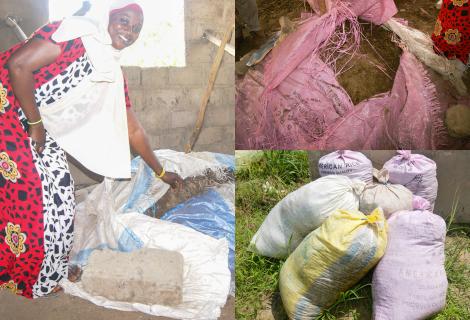Use of Organic Fertilizer Evolving Among Rural Women Farmers

Organic fertilisers are vital in sustainable agriculture and gardening as they enhance soil health, promote plant growth, and reduce environmental impact. By understanding the various types, benefits, and application methods, gardeners and farmers can effectively utilise organic fertilisers to improve crop yields and maintain healthy ecosystems.
In June 2024, ActionAid International The Gambia, with its partners, launched the Strengthening CSO Support and Advocacy for Sustainable Production and Use of Organic Fertiliser in The Gambia (SAPOF) project, aimed at promoting organic farming and agroecology practices in The Gambia.
Funded by the European Union, the project is conceived to promote Climate Resilient and Sustainable Agriculture (CRSA) to adapt to and mitigate the impacts of climate change while maintaining productivity and sustainability.
Following its launch, the project trained more than 100 women, youth, and persons with disabilities in CRSA practices and organic/compost fertiliser production within its intervention regions of the Central River and North Bank Regions.
These women and young people are now producing their fertiliser and practising CRSA, having abandoned chemical fertiliser in favour of organic fertiliser, citing the benefits of its usage.
"Our yield has increased since we started using organic/compost fertiliser. We have stopped using chemical fertiliser since then,” said Mbee Sillah from Kunting Village, Central River Region, North, during a Monitoring and Evaluation visit.
Organic fertilisers are derived from natural sources and are used to enhance soil fertility and promote plant growth without synthetic chemicals. They can improve soil structure, increase microbial activity, and provide essential nutrients to plants.
"With organic/compost fertiliser, your products are durable and healthy. This is why we embraced it. We don't allow chemical fertilisers in our garden," said Kumba Jallow from the Farmer Field School in Jahawur Mandinka.
Climate resilient and sustainable agriculture is essential for ensuring food security and environmental sustainability in the face of climate change. By adopting diverse, innovative, and sustainable practices, farmers can enhance their resilience to climate impacts while contributing to the health of ecosystems.
All the trainees conducted step-down training in their gardens and communities and advocated for organic fertiliser and CRSA practices. Many gardens have now banned the use of chemical fertiliser. A heavy fine is levied against anyone found using them in the garden.
"Following my training at Dalaba, CRR – South by SAPOF on organic/compost fertiliser and CRSA, I have trained more than 30 women on compost production. We have produced enough for use, and some are ready for sale," says Fatou Darboe, a farmer field school member from Kaur Janneh Kunda, CRR - North.
"Since I embraced organic farming, the transformation has been remarkable. I noticed a significant difference in my harvest. My onions, once short-lived and vulnerable, are now fresh and durable, thanks to organic manure,” said Ya Sohna Ceesay from Pakou Njogou Village, North Bank Region.
She added that the quality and variety of her crops have flourished like never before. “It's time for all of us to shift our mindset to organic; it is not just better; it's the future of sustainable agriculture."
For Ndella Dampha of Conteh-Kunda Niggi, farming and gardening are pathways to independence and empowerment, a way to combat poverty and food insecurity at home.
“The training on CRSA has transformed my understanding. Now I can produce compost fertiliser and eco-friendly or organic pesticides, and I have also adopted innovative farming methods that adapt to climate variability. Thanks to ActionAid International The Gambia for investing in my growth and that of my fellow young farmers,” she said.
“Post-training on CRSA, I have engaged with over 200 women in my community through step-down sessions. I have reached 3 different women’s groups with a membership of 30, and to this day, I have sensitised 90 women on compost-making and sustainable agroecology practices,” says Adama Sonko, Kumbanye Mandinka.
She believed women had shifted away from chemicals and fully embraced organic fertiliser for their gardens. “Together, we are cultivating a healthier future.”
However, collaborative efforts among governments, NGOs, research institutions, and local communities are crucial for promoting and supporting climate-resilient agricultural practices. Through education, policy support, and resource access, the agricultural sector can adapt to changing conditions and thrive sustainably.